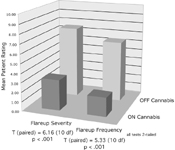|
Source: O'Shaughnessy's Patients in a pilot study report wide-ranging benefits and reduced reliance on drugs with adverse effects. SYMPTOM CHANGES reported by patients in the CCRMG Pilot Study on Crohn's disease, 2005. Graph at left compares the severity of symptoms for vomiting, depression, nausea, gut pain, and fatigue by patients when using cannabis (bars in front row) and without using cannabis (bars in rear row). Graph at right shows effect of cannabis on appetite and activity. Graphs represent mean paired values.
With co-authors Tod Mikuriya, MD, and David Bearman, MD, and statistical support from Milton Harris, PhD, I developed a questionnaire to assess the changes that Crohn’s patients experience when they use cannabis on an “ad lib” basis. We and SCC colleagues identified 32 Crohn’s patients. Eighteen expressed willingness to participate and 12 completed questionnaires. Our results were reported at the International Association for Cannabis as Medicine conference at Leiden University in the Netherlands in September. For all signs and symptoms evaluated in the study, the patients described marked improvements with the use of cannabis. Beneficial effects were reported for appetite, pain, nausea, vomiting, fatigue, activity, and depression. Patients also reported that cannabis use resulted in weight gain, fewer stools per day and fewer flare-ups of less severity. Each patient rated all of these signs and symptoms on a 0-10 scale both on and off of the use of cannabis. The average or mean values were then compared with paired T tests to show the average improvement patients report for each category of study. A probability value was recorded for each measurement to show how likely or unlikely these results could be expected to occur randomly. All probability values, P values, reported were found to be significant ( P= < .05 ) for the categories measured. Crohn’s disease remains a disease of unknown etiology. It occurs in about seven out of 100,000 population, typically in people of European decent. What can be said about it is that the immune system in the GI tract is overreactive, misguided and destructive to the intestine. Components in cannabis are thought to exert some of their beneficial effects by interacting with cannabinoid receptors in the intestine. Cannabis-using Crohn’s patients not only report significant relief of their symptoms, they are also able to reduce the amount of immunosuppressive medications that have been a mainstay of conventional treatment. Imuran, methotrexate, 6 MP, and Remicade (an anti-TNF drug) are greatly reduced. Asacol and Pentasa brands of Mesalamine, an anti-inflammatory medication with immuno-modulating properties is also reduced in many cases. Steroids are noted to be reduced and often eliminated. The immunosuppressives cause the same side effects that the disease causes: nausea, vomiting, abdominal pain, and diarrhea. Mesalamine frequently was reported to cause rash, itching, and photosensitivity. Steroids have a host of common side effects including anxiety, depression, irritability, nausea, vomiting, abdominal pain; and, with chronic use, bone thinning, glucose intolerance, peptic ulcers, and the Cushingoid state. Though our results are reliable and statistically significant, they could be ignored as invalid because of the nature of the study. The patients were self-selected, presenting to their doctor for approval to legalize their use of cannabis. They all used their own cannabis of unknown quality and quantity. There were no control groups of Crohn’s patients who did not use cannabis; nor were there any placebo-controlled trials with a group of patients using cannabis stripped of its active ingredients. Despite the fact that this pilot study deviates from the “gold standard” study involving a treated group matched to a control group of untreated patients double-blinded (where neither the researcher nor the patient knows if they are getting the “real medicine” or not), the patients who responded nonetheless, unequivocally report improvement in their symptoms and quality of life. Some of the patients’ responses include these telling remarks:
Our results are supported by a study published in the August 2005 issue of the journal Gastroenterology. Researchers at the University of Bath determined that cannabinoids activate the CB1 and CB2 receptors in the gut lining, promoting it to heal the inflamed lining of the gastrointestinal tract. Whereas the researchers in England are looking to synthesize cannabis-like drugs that have these therapeutic benefits, California doctors are in a situation where the natural medicine is available now. Many of us feel we don’t need chemists from the pharmaceutical industry to reinvent these molecules. Cannabis works very well to relieve suffering. Patients using it show significant improvement in their symptoms, weight, and the frequency of stools. Crohn’s disease is so debilitating and life-threatening and so difficult to manage with conventional medications it is very encouraging to find that cannabis is proving to be an effective treatment for it right now. We hope to continue beyond the pilot study as more Crohn’s patients become aware of the beneficial effects of cannabis. Continuing to pretend that cannabis has no health benefits, that it is addictive and dangerous to society as portrayed by the Controlled Substances Act of 1970, should be and is an embarrassment to civilized human beings. Cannabis should be removed from scheduling and prescribed as any other medication. |








カナビスとカナビノイドの臨床応用 消化器疾患MichelleRainey.com